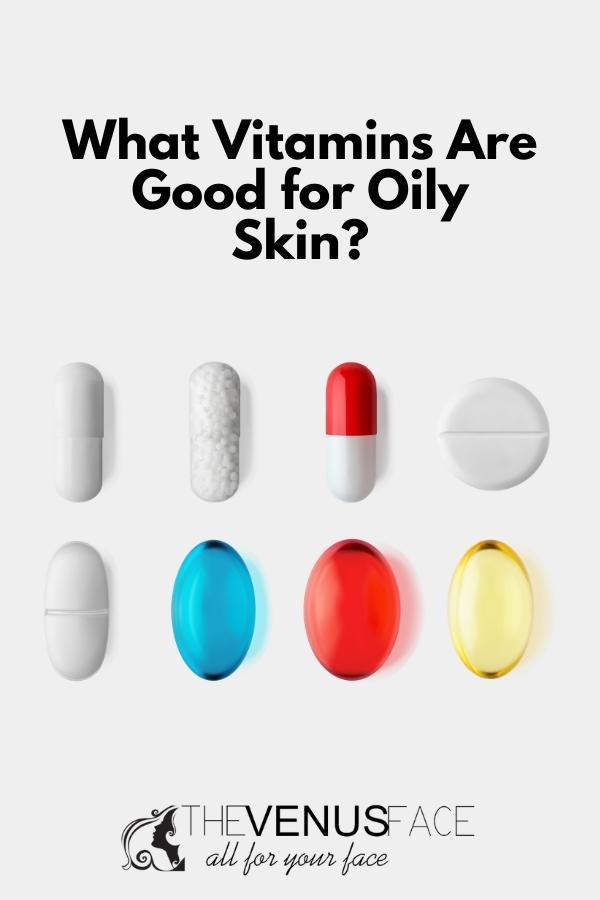Learn what vitamins are good for oily skin in this blog post.
Oily skin is a very common skin type that is characterized by excess sebum production. Although this excess oil can help to keep the skin hydrated, it can also lead to a number of problems, including clogged pores, blackheads, and acne. Oily skin is caused by overactive sebaceous glands, which are stimulated by hormones. Genetics also plays a role in determining how much oil the skin produces. There are a few things that can trigger excess oil production, such as hot weather, humid conditions, and certain cosmetics and skincare products. The good news is that oily skin can be managed with the right skincare routine. A variety of products are available that can help to control oil production and keep the skin looking and feeling its best.
To treat this skin problem effectively, it’s essential to know which vitamins are good for oily skin. This article will discuss some vitamins that can help to improve the condition of oily skin.

Can vitamins help with oily skin?
Yes, it can. Vitamins can help not only the skin but also the hair, nails, and many other aspects of your appearance. Vitamin deficiency can cause oily skin, so it is important to make sure that you are getting the recommended daily allowance of vitamins.
Which vitamins is good for oily skin?
All vitamins contribute to the health of your skin more or less, but some vitamins are more beneficial for oily skin than others. The most important vitamins for oily skin are:
Vitamin A
Vitamin A is an essential vitamin that helps to keep our skin healthy. It can be found in many foods, including eggs, dairy products, and liver. Vitamin A is also available in supplement form. Vitamin A is important for maintaining the integrity of the skin barrier. It helps to keep the skin hydrated. Additionally, vitamin A promotes collagen production and cell turnover. This can help to reduce the appearance of fine lines and wrinkles. Vitamin A can also help to treat acne by reducing inflammation and promoting cellular turnover. For people with oily skin, vitamin A can help to regulate sebum production. This can help to reduce the incidence of breakouts. Vitamin A is a powerful tool for keeping our skin healthy.
Vitamin B2
Vitamin B2, also known as riboflavin, is a water-soluble vitamin that is part of the B vitamin family. These vitamins are essential for energy metabolism, and they also play a role in cell growth and repair. Riboflavin is found in many foods, including meats, dairy products, and some leafy green vegetables. It is also available in supplement form. Cell growth can be stimulated by using microcurrent therapy.
Vitamin B2 deficiency can cause oily skin. However, consuming more vitamin B2 than is necessary will not have any effect on the oiliness of your skin. The recommended daily allowance of vitamin B2 is 1.1 mg for women and 1.3 mg for men.
Vitamin B3
Vitamin B3, also known as niacinamide, is a water-soluble vitamin that is often used in skincare products. Niacinamide can help to improve the appearance of oily skin by reducing the production of sebum, which is the skin’s natural oil. In addition, niacinamide can help to reduce the appearance of enlarged pores and acne. Because it is water-soluble, niacinamide is less likely to cause irritation than other vitamin B derivatives. As a result, it is an ideal ingredient for those with oily or acne-prone skin. When used in combination with other skincare ingredients, niacinamide can help to improve the overall appearance of the skin.
Vitamin C
Vitamin C is a very important nutrient for the body and plays a vital role in the production of collagen. It is also an antioxidant, which means it helps to protect cells from damage. However, vitamin C can also be very beneficial for the skin. It can help to reduce inflammation and sun damage, and it can also help to improve the appearance of acne scars. When applied topically, vitamin C can help to brighten the skin and give it a more even complexion. It is also thought to help stimulate collagen production, which can lead to firmer, younger-looking skin. For people with oily skin, vitamin C can prevent breakouts, which is a common side effect of excessive sebum production. Read more about vitamin C benefits and how to use it in your skincare routine.
Vitamin E
This vitamin indirectly helps with skin issues. It helps to keep the skin hydrated and protects it from sun damage. Additionally, vitamin E is a powerful antioxidant that can help to protect the skin from free radicals. These are unstable molecules that can damage cells, leading to premature aging. Vitamin E is found in many foods, including nuts, seeds, oils, and avocados. It is also available in supplement form. However, it is not recommended to apply vitamin E directly to the skin, instead, mixing it with your moisturizer or buying a store-bought moisturizer containing vitamin E is best. Read more about vitamin E benefits and how to use it in your skincare routine.
Zinc
Zinc is an essential mineral for keeping the skin healthy and balanced. It plays a role in cell turnover, collagen production, and wound healing. Zinc also helps to reduce oil production, making it an important ingredient for people with oily skin. When used topically, zinc can help to control shine and keep pores clear. It is often found in skin care products designed for oily or acne-prone skin, as well as in sunscreens and foundations with a matte finish. In addition to its benefits for the skin, zinc is also important for immune function and sexual health. It can be found in foods like oysters, red meat, and dark chocolate, as well as in supplements.
More: List of Best Facial Oils for Oily Skin on the Market
Final thought
Oily skin is a common problem, but it can be controlled and improved with the right skincare products. The vitamins A, B2, B3, C, and E are all beneficial for oily skin, as is zinc. In addition to using these ingredients in your skincare routine, it is important to keep your skin hydrated by drinking plenty of water and eating a balanced diet. following these tips will help to keep your skin looking its best.
More: Best Natural Oils for Oily Skin & Their Superb Benefits
F.A.Q
Does vitamin D help oily skin?
It does, indirectly. To know more about how vitamin D can help with oily skin, you can read this article.
Does vitamin A help with oily skin?
Yes, it does. Vitamin A helps to regulate oil production and can reduce the appearance of enlarged pores. It is often found in products designed for oily skin.
Can vitamins cause oily skin?
There is no evidence to suggest that taking vitamins can cause oily skin. However, vitamin deficiency can lead to problems like acne and other skin conditions, including oily skin, so it is important to make sure you are getting enough of the right vitamins. Also, over-consuming certain vitamins, such as vitamin A, can have negative consequences for your overall health. So, it is best to get consulted with a doctor or nutritionist whenever you are considering taking a vitamin supplement.


